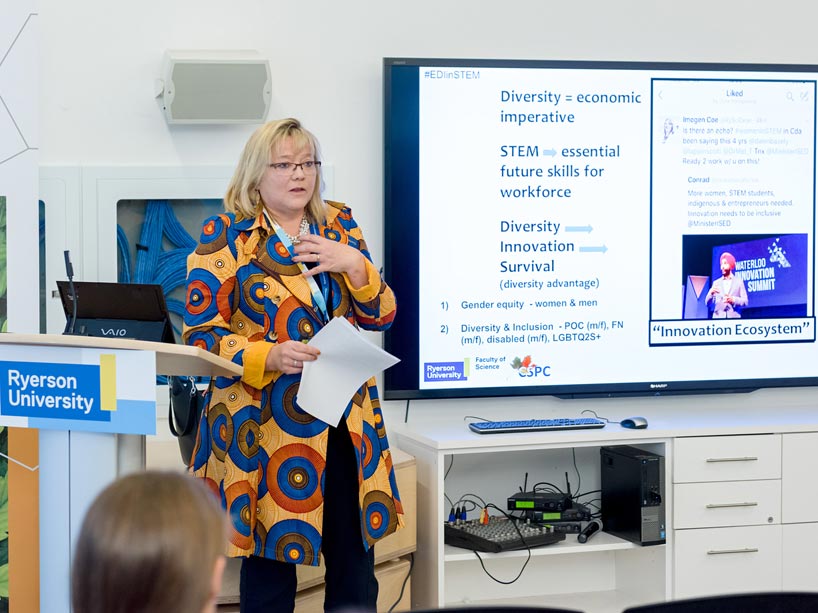Equity in the sciences: "Enough talking, more action"

Photo: Imogen Coe, dean of Ryerson’s Faculty of Science, talked equity in STEM at the Sandbox by DMZ on October 12.
How can science, technology, engineering, and mathematics (STEM) sectors better foster equity, diversity and inclusivity (EDI)? The Faculty of Science (opens in new window) and the Canadian Science Policy Centre (external link, opens in new window) hosted a roundtable meeting with 44 stakeholders from various sectors earlier this year to share their experiences and perspectives. The findings and recommendations were unveiled at an event October 12 at the Sandbox by DMZ.
“How can you have innovation if you don’t have diversity? Diversity drives innovation, and innovation is needed for survival,” said Imogen Coe, dean of the Faculty of Science, to the audience. “Diversity is an economic imperative, and we know that innovation in the future is going to need STEM-based skills. We see this massive rush into A.I. and machine learning—we know that we’re going to need a very deep, wide work force for future skills, and we need that diversity in that pipeline.”
The report (opens in new window) summarized 12 recommendations:
- Changing perceptions and challenging stereotypes within STEM-based professions.
- Pursuing evidence-based and data-driven programming to enhance EDI in STEM in each sector and organization.
- Building EDI into the culture of academic and professional environments by increasing awareness and training.
- Building EDI into STEM-programming across sectors and organizations.
- Within organizations, build intentionally for EDI into hiring practices and at every other stage of the STEM talent pipeline.
- Building EDI into the work environment by creating, embracing and supporting inclusivity.
- “Asking and listening… and then listening some more.”
- “What gets rewarded gets repeated; what gets measured gets done.”
- Being prepared to manage conflict as a consequence of increasing diversity within organizations.
- “Enough talking, more action.”
- Holding organizations accountable for EDI in STEM.
- Working together towards common goals.
The report also recommends four next steps: 1) Identify best practices for embracing EDI in STEM within institutions and organizations; 2) Identify responsibilities in affecting real change (i.e. co-ordinating efforts between education and the workforce); 3) Examine issues of accountability and consequences (i.e. hold organizations accountable for failure to incentivize EDI); and 4) Rethink STEM (i.e. reconsider what is valued with respect to including feminist and race perspectives, Indigenous knowledge, etc.).
Coe encouraged the audience to think of EDI as an ecosystem that spans from birth to school to the workplace and beyond. “From the moment they’re born, every baby is a natural scientist, every baby is naturally curious. … A very successful business woman said, ‘I’ve always loved math, but one of my professors said I’m good at math but will never be a mathematician.’ These stories—there are thousands of them. And these are the things that make people leave this pipeline.”
Coe also made the point that EDI should not be conflated with gender equity. “We need to have all human endeavours look like the world looks, which is 50 per cent women,” she said. “I get asked to talk a lot about ‘women in science.’ I say, ‘No, I’m not going to talk about women—I will talk about equity, diversity and inclusion, because women are not a homogeneous group.’ Within 50 percent of the population, whether it be men or women, there is massive diversity. Not all women are the same; not all men are the same.”
Mehrdad Hariri, chief executive officer of the Canadian Science Policy Centre, emphasized the need to ensure that EDI initiatives are combined with policy change. He also spoke from his own experiences as an immigrant in a white-male-dominated environment. "We want to make sure that science policy itself is a diverse and inclusive environment, and everyone with talent can contribute to the landscape.”
To read the complete report, “Equity, Diversity and Inclusivity in Science, Technology, Engineering, and Mathematics: Forging Paths to Enhanced Innovation,” go to ryerson.ca/edistem (opens in new window) . Imogen Coe and Ana Sofia Barrows also discussed EDI in STEM with CBC News (external link, opens in new window) .